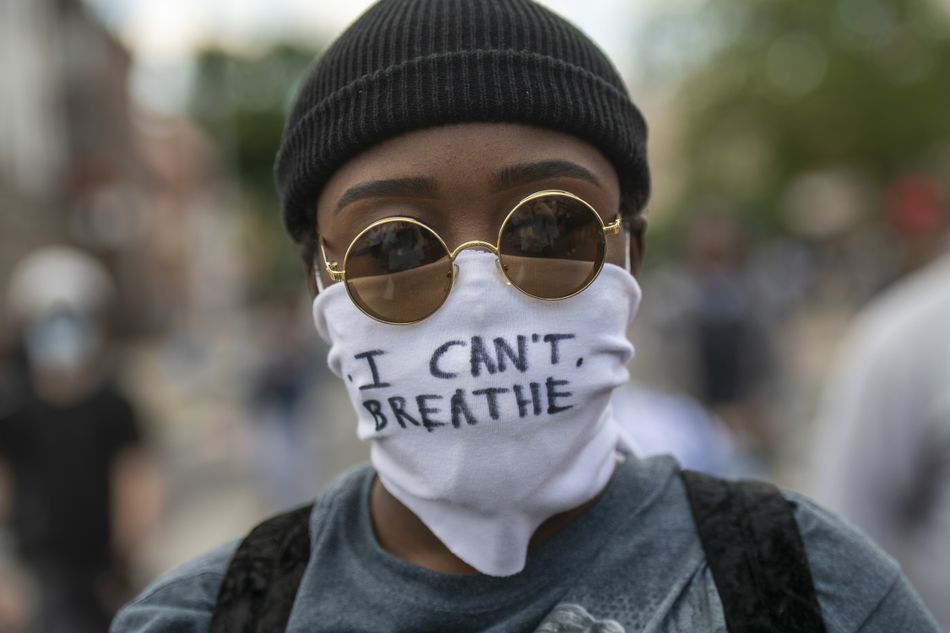Before George Floyd died while a police officer knelt on his neck for nearly nine minutes, he rasped “I can’t breathe.”
It was the same gut-wrenching phrase uttered by Eric Garner when a New York cop had him in a chokehold before he died in 2014. Since then it has been a constant rallying cry at Black Lives Matter and police brutality protests. It’s come to represent how suffocating it can be to be black in America. The Minneapolis cop whom Floyd begged for air has been charged with 3rd-degree murder. The New York cop was never charged with a crime and was only fired last year.
Now as protests spread across America and internationally to demand justice for Floyd, those final words have made their way onto coronavirus masks. The face mask, once just the symbol of a virus that attacks the lungs, has become a protest sign for those who can’t breathe in other ways, too.
People have been gathering en masse for the first time in months since COVID-19 stay-at-home orders rippled throughout the world. They’re mad about Floyd, yes, but it runs deeper than that. They’re also incensed by the killings of Breonna Taylor, Tony McDade, Philando Castile, Walter Scott, and the many, many other black people who have died in police shootings. They’re angry about Ahmaud Arbery, too. Arbery wasn’t killed by police but his February death was nearly buried by local officials until cellphone footage emerged of him being pursued by two armed white men in a South Georgia neighborhood. Both men have been charged with murder. The protesters are calling for an end to police brutality, systemic inequality, and racial oppression.
After months alone, they were ready to say so together — with their chants, with their signs, and with their pandemic masks.

A protester marches with a cloth mask stating “I CAN’T BREATHE” in the aftermath of widespread unrest following the death of George Floyd on June 1, 2020 in Philadelphia, Pennsylvania.
Image: Mark Makela / Getty Images

A protester in Washington, D.C. wears a protective mask with “I CAN’T BREATHE” written on it on May 30, 2020.
Image: Probal Rashid / LightRocket via Getty Images

A protester at a Black Lives Matter solidarity demonstration outside St. George’s Hall on June 2, 2020 in Liverpool, United Kingdom.
Image: Christopher Furlong / Getty Images

A protester wears a face mask with the words “I can’t breathe” written on it during a Black Lives Matter rally in Hyde Park on June 2, 2020 in Sydney, Australia.
Image: Lisa Maree Williams / Getty Images

Wearing a mask he designed himself that reads, “I can’t breathe,” artist Theo Ponchaveli poses on June 1, 2020 in front of a mural he painted in Dallas, depicting the scene of George Floyd in custody.
Image: Tony Gutierrez / AP / Shutterstock

A protester wears a face mask reading “I can’t breathe” in Spanish, during a Black Lives Matter demonstration on May 28, 2020 in New York City.
Image: JOHANNES EISELE / AFP via Getty Images)

A man wears a face mask as people take part in a protest on Foley Square in front of the Manhattan courts on May 29, 2020 in New York.
Image: Stephen Ferry / VIEWpress

A woman poses as she wears a mask saying “I can’t breathe” at the makeshift memorial in honor of George Floyd on May 30, 2020 in Minneapolis, Minnesota.
Image: CHANDAN KHANNA / AFP via Getty Images

A demonstrator in Houston on June 2, 2020.
Image: David J Phillip / AP / Shutterstock

A protester on May 28, 2020 in Milan, Italy.
Image: Alessandro Bremec / NurPhoto via Getty Images
